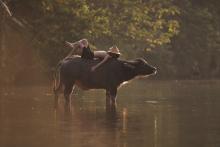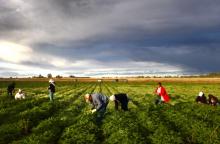fields

Justice work is good work. It is a high calling. It deserves great effort and exertion. But in today’s world, if our work in the realms of social justice mimics the exhausting routine of the fiercely competitive struggle for wealth and power, we would do well to take a moment to consider the biblical rhythm of Sabbath.
The esteemed rabbi Abraham Joshua Heschel wrote in The Sabbath that the holy day serves as a “sanctuary in time.” The invitation of the Sabbath is a summons to dwell in the eternality of time, he wrote, to turn from “the results of creation to the mystery of creation, from the world of creation to the creation of the world.”

It's odd that Christians — people who claim to believe that God created the earth, sustains it day by day, and intends to create a new earth — are often so mixed up about sex and food. How long would the earth's inhabitants last without coupling and eating?
And yet most Christian writers right up to the 16th century praised celibacy, sexless marriages, and arduous fasting. Bless Martin Luther for loving his wife (and the beer she brewed), but lots of us still seem to think that good sex and good food — if not actually sinful — are at least pretty low on the religious values hierarchy.
Has it escaped our attention that, according to our most sacred literature, God made a naked male and a naked female, put them in the midst of grain fields and orchards, and told them to multiply?
Food-related coverage in this issue was supported by ELCA World Hunger (www.elca.org/hunger)
The Psalms are the icons of the Bible. Icons are paintings of Christ or another holy figure used in worship and devotions in the Eastern Orthodox tradition. They are, like the Bible itself, understood to be inspired by the Holy Spirit. The psalms resemble icons in that they are the most visual part of the Bible: They speak to our religious imaginations in memorable verbal images; they create pictures in our minds. Icons are considered to be “windows into heaven.” They are an opening from our world into the world to come. But of course one can look through a window in both directions: Icons open out from this world into the kingdom of God, and at the same time they let us see our world from the perspective of that one.
And that is exactly what the psalms do: They reveal to us our world, our own lives, from a God’s-eye point of view. When you ponder a psalm deeply, you find your ordinary perspective on the world challenged and gradually changed.
I want to focus on Psalm 65, which speaks to us powerfully about God and creation and our own place in the created order. As you read it, think of yourself as encountering an icon, a holy image given us so the eyes of our hearts may be enlightened, as the Apostle Paul says (Ephesians 1:18), so that we may see our world and ourselves as God might see us.
In this verbal icon, I see four things that might surprise us, enlightening the eyes of our heart.

About every five years the Farm Bill addresses a broad set of food and agricultural policy issues. Commodity price supports, farm credit, trade, agricultural conservation, research, rural development, energy, and foreign and domestic food programs were just some of the issues included in the Food, Conservation, and Energy Act of 2008, as the last Farm Bill legislation was officially titled.
The Farm Bill is also known for the broad range of policy stakeholders who work on it, including state organizations, national farm groups, commodity associations, conservation advocates, rural development organizations, and faith-based groups.
But even with its inclusive set of policy issues and actors, the Farm Bill is notable for one issue policymakers and advocates doesn’t touch: People who work on farms.